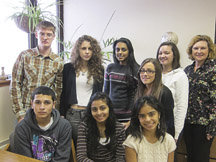The High Tech High School Science Club passed on the knowledge of a complex scientific concept through the art of acting when they made a presentation at Princeton University’s Science Day last month.
The Dec. 11, 2010 event hosted by the Young Science Achievers Program allowed students to participate in different science-related workshops with their peers.
Last year one High Tech senior began talking to Dr. Richard Shope of California about MIMES, a workshop under the Young Science Achievers, which allows students to act out difficult-to-understand concepts. Shope asked the students to put together a mime and travelled to North Bergen in June to watch them present it. He was so impressed that he asked them to appear at Science Day next year, and instead of just participate, present on the theme of superconductivity.
“This program reached out not just to the people who are interested in science, but the people who were interested in acting.” – Casandra Snearstone
________
“You take this concept of superconductivity, which normally it’s just like you’re reading it from a textbook [and] it’s really hard,” said Amr Tawfik of Bayonne. “You’ll just look at it for hours, maybe trying to picture it in your head and only come up with a little bit, but using the miming, you take this abstract concept and you get a concrete idea.”
Fun with science
Kajal Shah of North Bergen said that when they first got involved, they were asked to make jokes about what they were trying to teach.
“Minimal resistance was going to be our punchline,” she said. “A guy and a girl walk into a bar. All the other girls are looking at the guy. [So, the girl asked] ‘Dear superconductor of mine, why are all these girls looking at you?’ ”
They guy explains that they “can’t resist,” but that he picked his girlfriend because of how “cool” she was.
Union City resident Kristina Miller helped explain how magnetic fields could not penetrate a superconductor, called the Meissner Effect. She had one group of students act as thugs, or a magnetic field, and others play the part of the conductor, with students using shields and swords to break through. Before the conductor was brought below -32 degrees F, the thugs could fight their way through, but afterward they could not.
Teaching others
Casandra Snearstone of North Bergen used a skit about a shopaholic who couldn’t resist buying things to explain one concept involving resistance and conductors.
“This program reached out not just to the people who are interested in science, but the people who were interested in acting too,” said Snearstone.
Jill Carrera of Bayonne said that miming is an easier way to explain science to students who have a more visual or creative learning style.
Dr. Nina Lavlinskaia, the science department liaison, teacher, and science club mentor, said that they got involved because of their love of science and acting. Lavlinskaja also got Carrera involved.
“I was not exactly a science person; I’m more of a creative sort, [and] she introduced me to the whole miming thing,” said Carrera. “I got even more into it because it was taking the creative aspect of it and mixing something I was into.”
Tricia Tirella may be reached at TriciaT@hudsonreporter.com.
